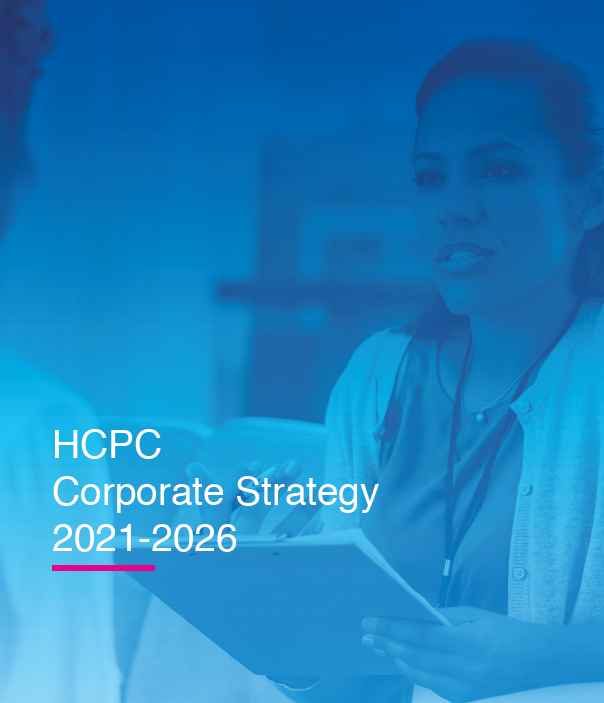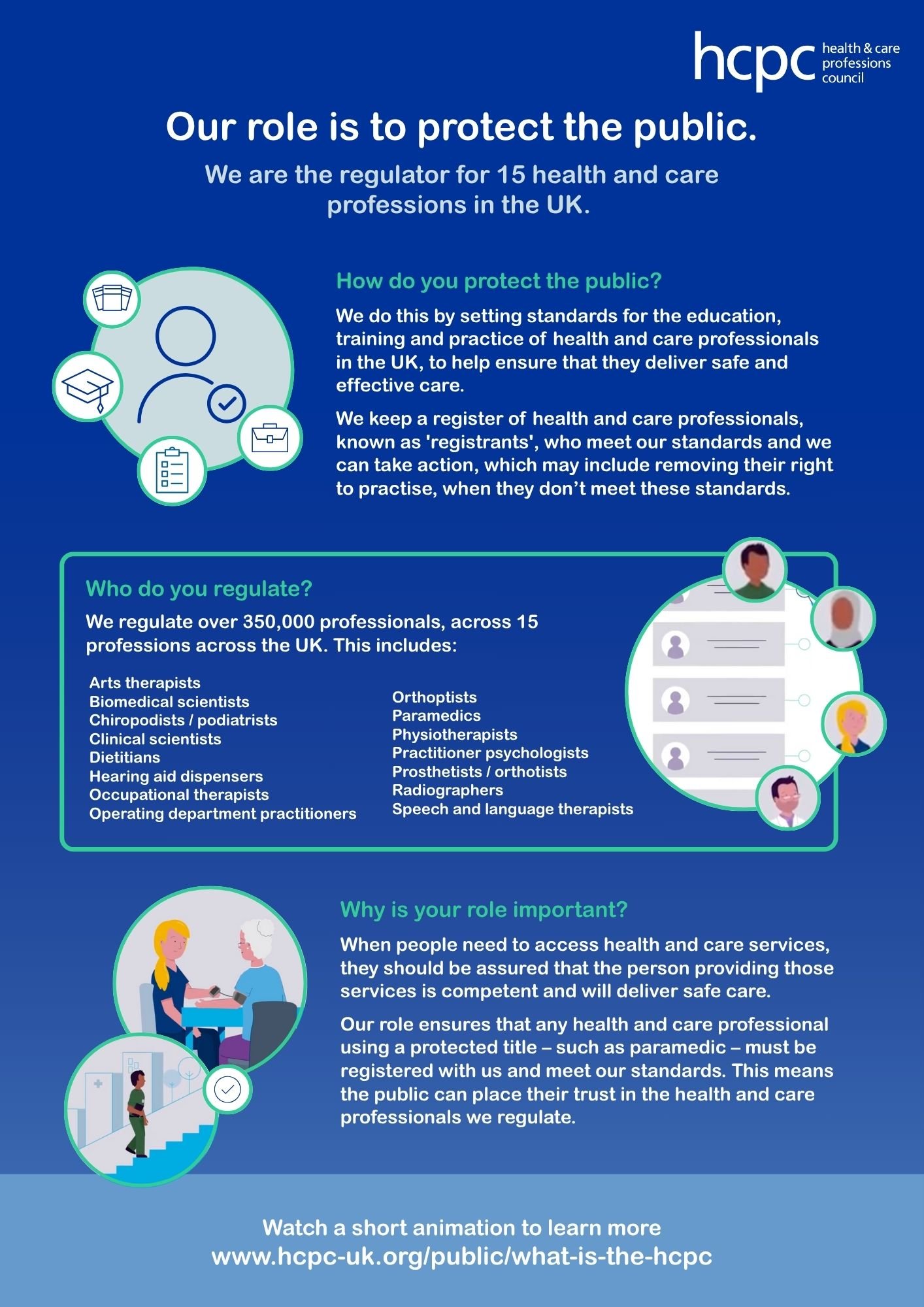Your chance to shape our future priorities
Join our workshop on developing our new corporate strategy.
We want to hear about the challenges and opportunities in our sector’s future, how these might impact health and care professionals and change the way people access care.
We want to hear from the public and our stakeholders.
HCPC Corporate Strategy 2021-2026
Our strategy sets out our commitment to improving our core regulatory performance and meeting all the PSA’s standards, particularly regarding our Fitness to Practise process.
It sets out an approach that is more empathetic and ultimately will be more effective in ensuring the very best outcomes for the public.
At the heart of our mission is to uphold high standards in the professions we regulate.
Our vision
To be a high performing, adaptable and caring regulator that ensures public protection through strong, evidence-based regulation
Our purpose
To promote excellence in the professions we regulate and champion high quality care that the public can access safely and with confidence
Core activities
- Maintain and publish an accurate register
- Set appropriate standards
- Quality assure education and training programmes
- Respond proportionally to Fitness to Practise concerns, taking action to protect the public
- We will harness our data to have more informed insights about the impact of our processes and take that learning to improve our regulatory activity, future approach and decision making
- We use what we know from our own learning, and that of others, to promote positive and inclusive professional working environments
- We will develop an approach based on preventative action. This will use our learning to address and reduce the conditions that may contribute to instances of service user harm
- This preventative approach will support quality practice by articulating the expected standards, helping registrants overcome any barriers they face in meeting those standards thereby reducing the need for unnecessary Fitness to Practise actions
Six priority areas of work
-
AimTo improve our performance against PSA standards of good regulation and to innovate across all our regulatory functions to provide an enhanced user experience
Where we expect to be by 2026
We will have met and sustained our performance against PSA standards of good regulation and ultimately gone above and beyond those standards to become a high performing regulator.
We will be recognised as a beacon of good practice, regulatory leadership and innovation.
We will have implemented a digital strategy which provides easily accessible processes and a positive user experience for our registrants and partners and all those interacting with us.
Our standards, guidance and processes reflect changes in approaches to education and the delivery of care. -
AimEnable our professions to meet our standards so they are able to adapt to changes in health and care practice delivery, preventing harm to service users.
Where we expect to be by 2026
Our regulatory standards, policies and guidance help our registrants adapt to the changing needs of people using health and care services.
Our approach to continuing professional development improves professionalism,
champions high standards of care delivered by our registrants and contributes to reducing incidences of serious Fitness to Practise concerns.
Through collaboration with professional bodies, education providers, employers, registrants, our partners and other stakeholders we develop guidance on our standards that supports professional practice, that are easily accessible and tailored to the needs of the individual professions we regulate. -
AimLearning from data and research to inform our decision making and share insights to protect, promote and maintain the health, safety and well-being of the public.
Where we expect to be by 2026
We use our data, and that of others, to proactively reduce harm to service users, support our registrants and influence wider policy development including making the case for broadening the scope of the professions, through advanced practice, and by bringing in other professions to statutory regulation.
We use data and insight to better support our workforce planning and wider service improvement.
Our data is accurate, accessible and useful.
Our stakeholders see us as a leading voice in multi-profession regulation, providing evidencebased contributions on professional standards and public protection. -
AimWe regulate, take and communicate decisions which are informed by a deep understanding of the environment within which our registrants, employers and education providers operate.
Where we expect to be by 2026
We have effective mechanisms for proactively listening to, engaging and communicating with, all our key stakeholder groups, including diverse and protected groups who may not traditionally have a strong voice.
We champion the values of equality, diversity and inclusion in everything we do.
We will be an active contributor to local/regional/national healthcare policy and practice
development.
We will be able to evaluate the impact of our work on the professions we regulate and use this to inform our decision making.
We will be responsive to those who contact us. -
AimEmployees feel valued and supported, and fully able to contribute. The organisation is resilient and able to quickly adapt to changes in the external environment.
Where we expect to be by 2026
The organisation continues to be financially sustainable, enabling us to invest in those areas of our operations which are most important to service users and patients, our registrants and partners.
We invest in our people, providing a caring environment with equal opportunities for colleagues to develop their skills.
We will improve our recruitment and retention, building capability and ensuring that we have the right skills and competencies to drive our current and future performance.
We will have a sustainability plan which will address how we work and environmental impacts in respect of office space, travel, procurement, energy and waste.
We will have invested in systems and processes to improve our stakeholders’ experience and drive efficiency. -
AimThe public, registrants, students and employers understand the value and importance of regulated health and care professionals.
Where we expect to be by 2026
The public have a better understanding of the professions that we regulate and our role.
The value of our register to the public, registrants and employers will be enhanced, with more accessible and useful information.
We will have implemented a registrant health and well-being strategy and action plan Registrants’ insights will be used to develop a more compassionate and person-centred Fitness to Practise process.
We will promote positive and inclusive professional working environments.
Monitoring and reporting
We will continue to work with and engage our stakeholders to get their feedback on how successfully we are delivering and implementing the key work areas identified within the strategy.
We will report annually on progress against the objectives we have set.
Our values
Fairness
Being honest open and transparent.
Compassionate
Treating people with respect, empathy and care.
Inclusive
Collaborating with others and championing diversity.
Enterprising
Seeking opportunities to improve our performance.



